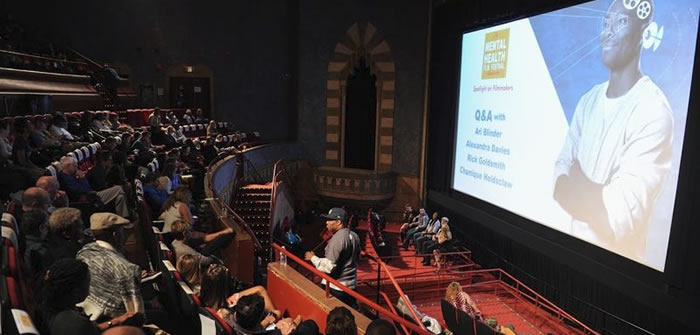The ways we watch TV and movies have evolved, and it’s time for the talent in front of and behind the camera to do the same. Film Forward speaks on the initiatives to diversify the film industry and the stories it tells. New articles premiere every second Thursday of — and throughout — the month.
This is the goal of the Community Access NYC Mental Health Film Festival, which has been screening films and fighting stigma since 2005. Described as “the oldest and largest mental health film festival in the United States,” the event is hosted by Community Access, which advocates for people with mental health concerns in New York City by providing housing, education, and other services.
“The NYC Mental Health Film Festival is about building community and showing the lives and humanity of people living with mental health concerns,” Community Access Development Associate Billy Glidden tells A Plus. “In this way, we hope to change the harmful, stigmatizing narratives associated with mental health issues in our society.”
Unfortunately, popular media often perpetuates these harmful stereotypes. Those who enjoy horror movies or even superhero franchises such as Batman have likely noticed how frequently mental health issues are associated with villainy. In such instances, real-life conditions are often misrepresented.
M. Night Shyamalan’s 2017 movie Split, for example, was criticized for its depiction of a man with dissociative identity disorder as a kidnapper. Dr. Garrett Marie Deckel told CNN that the film could possibly “upset and potentially exacerbate symptoms” among people actually living with DID, adding that such individuals are rarely violent.
“It sends a harmful, misleading message — one that reflects broader fears and misconceptions in our society,” Glidden says of such depictions. “People living with mental health concerns are far more likely to be victims of violence than perpetrators of it. Such portrayals erase that reality, and reinforce the stereotype that someone living with a mental health concerns should be shunned and avoided.”
The MHFF is working to challenge these inaccurate and unflattering onscreen portrayals by telling honest stories. As Glidden explains, “At our festival, we share the real stories of people living with mental health concerns — stories that remind us of the tremendous courage and resilience such people demonstrate each and every day.”
That representation is important behind-the-scenes as well. According to the festival website, “mental health recipients” are also involved in organizing the event, from selecting films to volunteering.
Starting in 2016, the festival introduced the Changing Minds Young Filmmakers Competition, to give filmmakers aged 15 to 25 an opportunity to share stories about mental health. The winning short film earns a cash prize and is screened at the festival. Filmmakers are encouraged to submit films which “promote social justice,” “combat stereotypes,” and “convey a message of hope.”
“Most mental health concerns start at a young age — 14 years old, according to some studies. We believed that young people had stories to tell, and that by giving them the opportunity to share these stories, we could help work toward a world where honest, open conversations about mental health wouldn’t be such an anomaly,” Glidden says of the competition, adding that the organization received more than 800 film submissions this year alone. “Screening the winning young filmmaker film at the festival is invariably one of the day’s highlights.”
The festival also welcomes speakers and panelists to share thoughts and lead discussions about mental health topics. Last year, actor John Turturro gave a speech about caring for his brother, who “lives with a serious mental health condition” and is a Community Access tenant. “Today, thanks to Community Access, life is different for me, and more importantly, for Ralph,” the actor shared.
It’s important for individuals to see people like them represented positively on screen, and that includes those with mental health concerns. The Community Access NYC Mental Health Film Festival has screened more than 50 films over the years, but it’s only one source of such representation. As Glidden tells A Plus, you also have the power as a moviegoer to help change the conversations around mental health.
“Viewers can do their part to spread the word about the truth about mental health concerns,” he says. “The more that public understanding of mental health improves, the more accurate the onscreen representation of mental health concerns will be. It is part of an ongoing process of sharing stories, educating the public, and pushing to have people’s basic humanity recognized.”
Tickets are now available for this year’s festival, which will be held at the Village East Cinema in New York City on Saturday, October 13. “The festival is a great opportunity for audiences to see great films and learn from one another,” Glidden says, encouraging people to attend. “In the process, we hope we’re helping to make the world a gentler, more compassionate place.”

